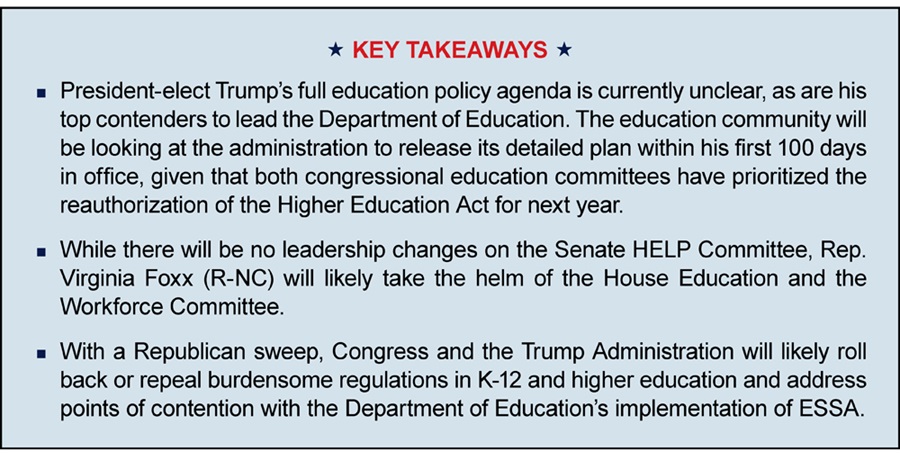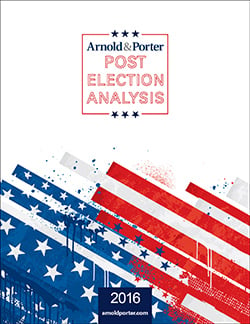Post-Election Analysis 2016: Education
Transition Team for Education
- Gerard Robinson – Resident Fellow at AEI; former state roles as Education Commissioner and Secretary
- Williamson Evers – Research Fellow at the Hoover Institution at Stanford University and former Department of Education official
Education Advisors
- Dr. Ben Carson – Former Republican presidential candidate and Pediatric Neurosurgeon
- Robert Goad – Senior Policy Advisor to Rep. Luke Messer (R-IN)
ADMINISTRATION PRIORITIES
President-elect Trump has not produced a robust education policy agenda, but his education priorities started taking shape last month with public statements made during a campaign stop to Columbus, Ohio. Earlier in the campaign, much of his comments on education centered around school choice and eliminating the Department of Education and the Common Core State Standards. While achieving these goals will prove to be difficult, President-elect Trump may spend significant resources working to defund signature Obama Administration education grant programs or restructure them as block grants or "smart grants" (as the transition team refers to them).
To date, the Trump campaign's only education proposal has been on school choice. Because the President-elect does not have a public record on education and has released very few details about his education agenda, the administration may take a backseat to education leaders in Congress, responsible for passing major education legislation overdue for reauthorization (e.g., the Higher Education Act). President Trump's top education advisors likely will work with those leaders – whether through authorization vehicles or standalone legislation – on expanding school choice simplifying student loan repayment, and instituting accountability measures for institutions of higher education. They also will look to work with other agencies to improve and expand support for child care, but most of those changes must be made through tax reforms. The administration also may consult with members of Congress to reform or repeal a number of President Obama's regulations, including the controversial gainful employment rule.
Child Care Support. While President-elect Trump did not discuss early childhood education much on the campaign trail, he frequently touted his plan, along with his daughter Ivanka Trump, to improve child care support for working families. His proposal, which seeks to guarantee six weeks of maternity leave and provides additional benefits in the tax code to offset the cost of care, as well as incentives for employers to offer on-site day care, could see some bipartisan support in Congress depending on the pay-for mechanisms.
Every Student Succeeds Act. The Department of Education has been aggressive in implementing the Every Student Succeeds Act (ESSA) prior to President Obama leaving office. It is likely that the Trump Administration will try to walk back some of the final rules or soon to be final rules under President Obama, particularly those with which Republican leaders in Congress disagree, such as the "supplement, not supplant" rule, proposed state plan requirements (e.g., new definitions of "educator effectiveness"), and proposed requirements on the School Quality or Student Success indicator.
Expanding School Choice. There is little doubt President-elect Trump will implement his school choice plan, which reprioritizes federal funding to create a $20 billion block grant for students living in poverty to attend the school of their choice. While the plan does not specify which federal funds would be reprioritized to create the program, individual states will be given the option of how to use the funding by developing their own formulas to ensure federal dollars follow the students. There will be incentives developed for states to kick in funding as well.
College Affordability and Student Debt. President-elect Trump has not released a written plan to address college affordability, but he did commit to making the repayment process easier for student borrowers during the campaign. He discussed the need for a single new loan repayment program that caps repayment at 12.5 percent of graduates' incomes and provides loan forgiveness for all borrowers who repay their loans after 15 years. The President-elect also questioned colleges' spending and vowed to force institutions to cut tuition rates. We expect the Trump Administration to propose a plan to remove the tax-exempt status of colleges and universities with large endowments who are not reducing tuition rates. President-elect Trump, however, likely will attempt to do this in conjunction with a plan to reduce or eliminate burdensome federal regulations to help reduce costs for institutions of higher education that can then be passed along as savings to students.
AGENCY LEADERSHIP
For months, Dr. Ben Carson was the only person floated as a possible Secretary of Education after the pediatric neurosurgeon dropped his bid for the White House and endorsed President-elect Trump. While other names have been discussed, we expect the future Secretary will seek to limit the role of federal government in education, cut red tape, and empower states, local leaders, and parents. Some other individuals who might get the nod from President-elect Trump include:
- Rep. Luke Messer (R-IN). Robert Goad, a senior advisor to Rep. Messer on the House Education and the Workforce Committee, took a leave of absence in August to advise President-elect Trump's campaign on education issues. While the President-elect’s relationship with most members of Congress has not been great, Rep. Messer and Vice President-elect Pence both hail from Indiana, and the move could be seen as an olive branch to congressional Republicans.
- Gerard Robinson. Mr. Robinson is a resident fellow at the American Enterprise Institute and former Florida commissioner of education and Virginia secretary of education. He has legitimate conservative chops on school choice and regulatory issues and has experience at the state level on K-12 and higher education issues. Additionally, he has served on President-elect Trump's transition team for education.
CONGRESSIONAL LEADERSHIP
House. It is widely expected that former community college president Rep. Virginia Foxx (R-NC) will take the helm of the House Education and the Workforce Committee in January. She serves as secretary of the House Republican Conference and as the vice chair of the powerful House Rules Committee. Additionally, she is the chair of the Subcommittee on Higher Education and Workforce Training and has made known her candidacy for the education committee's top spot. Rep. Virginia Foxx has supported Trump and will likely look to work with his administration to roll back regulations she believes have hurt the higher education industry, including rules related to overtime pay, defining the credit hour, gainful employment, distance education, and teacher preparation.
Her Democratic counterpart on the committee will be the current ranking member, Rep. Bobby Scott (D-VA). Despite differing views on education policy, Rep. Scott worked well with outgoing Chair John Kline (R-MN), particularly on crafting a bipartisan career and technical education reauthorization bill. With a Republican sweep across Congress and the executive branch, however, it is unlikely Republicans in the House will have a need to cultivate Democratic support for major initiatives. Reps. Foxx and Scott have worked together on very few policy items while on the House Education and the Workforce Committee. Yet, they may find some common ground on the need for additional data transparency measures for higher education, given their previous support for the Strengthening Transparency in Higher Education Act (H.R. 3178) that passed the House in July 2016 but did not see any action in the Senate.
Senate. Sen. Lamar Alexander (R-TN) will remain chair of the Health, Education, Labor and Pensions (HELP) Committee. He and Sen. Patty Murray (D-WA), the committee's current ranking member who is expected to stay on, have established a productive working relationship and should transition seamlessly into the new Congress. It is likely they will team up at times to block or deride select joint priorities of President-elect Trump and House Republicans, such as defunding the Department of Education.
CONGRESSIONAL PRIORITIES
Despite the fact that both chambers will remain in Republican hands, the congressional dynamics around education policy are expected to change in a number of ways in the 115th Congress. The work of the House Education and the Workforce Committee and Senate HELP Committee will be marked by continued oversight efforts related to implementation of ESSA and the Workforce Innovation and Opportunity Act (WIOA), in addition to several final regulations published by the Department over the last month. In fact, Congress could work with the Trump Administration to reform or repeal regulations to provide relief to the higher education sector in addition to addressing areas where Republicans believe there is federal overreach within ESSA guidance and regulations. Congressional Republicans could fast track select bills, with the administration taking a back seat. We also expect to see a reinvigorated effort on several policy issues that have been stalled in recent years, including reauthorization of the Higher Education Act (HEA) and the Carl D. Perkins Career and Technical Education (CTE) Act, if not authorized during the lame-duck session. While these rewrites historically have been bipartisan, Republican leaders, particularly in the House, may argue they have a mandate based on the election to quickly push through partisan legislation on overdue reauthorizations.
Higher Education Act Reauthorization. HEA reauthorization is on the top of the list of priorities for both Rep. Foxx and Sen. Alexander in the 115th Congress. There was some hope that the goodwill built between the House and Senate education leaders during the passage of ESSA would lead to a bipartisan HEA reauthorization bill in the 114th Congress. Despite this sentiment, most of the work on HEA in the last year has been at the committee staff level, and there have been no serious efforts made to introduce an HEA bill this year. We expect work to begin on HEA reauthorization legislation early in 2017.
The Senate is likely to continue to work in a bipartisan fashion on HEA reauthorization given the strong working relationship between Sens. Alexander and Murray. Sen. Alexander has consistently stated his priorities include simplifying how financial aid is made available and providing regulatory relief to institutions to help keep costs down. Sen. Murray has said she will focus on increasing access to college for low-income students and making college more affordable for all students.
With President-elect Trump in office, college affordability aspects of HEA are likely to include provisions to refinance student loans, simplify repayment programs, and cap income-based repayment. Rep. Foxx has said she plans to focus on decreasing the number of burdensome regulations on institutions of higher education and ensuring data collected from universities is more transparent and useful. President-elect Trump agrees and has stated institutions will be able to pass on to students the cost savings from regulatory relief by lowering tuition. The Trump Administration also may push for more accountability measures including risk-share and working with the Judiciary Committee on reviewing the relationship between endowments and some institutions' tax status. In the 112th Congress, Sen. Chuck Grassley, current chair of the Judiciary Committee, conducted oversight on how colleges and universities use their endowments.
Career and Technical Education. Congress may complete its work on CTE reauthorization during the lame-duck session. The House overwhelmingly passed its CTE reauthorization bill on September 13, and the Senate may take action on a companion measure when it returns to Washington, DC later this month. A major hold-up was a disagreement over secretarial authority in the Senate between Chair Alexander and Ranking Member Murray. Sen. Murray, however, may reconsider her argument given the results of the election and look to reach an agreement with the chair. We believe this is unlikely to rise to the top of the overall Senate priority list during the lame duck; if that is the case, we expect the 115th Congress to move quickly to re-introduce and pass CTE legislation early next year.
Student Data Privacy. Student data privacy is likely to remain a popular topic in the 115th Congress as members attempt to update current privacy laws to ensure they recognize the complexity of student privacy in an increasingly digital world. Despite not marking up a student data privacy bill prior to the election, the House Education and the Workforce Committee made a serious effort last year on legislation to update the Family Educational Rights and Privacy Act (FERPA). It is unclear whether an updated FERPA bill would remain a priority under Rep. Foxx. We expect many of the lead sponsors of the various student data privacy bills in the 114th Congress, such as Rep. Jared Polis, Rep. Luke Messer, Sen. Edward Markey (D-MA), and Sen. Orrin Hatch (R-UT), will re-introduce some of these measures in the 115th Congress.
Our full analysis of the 2016 election is available below.





